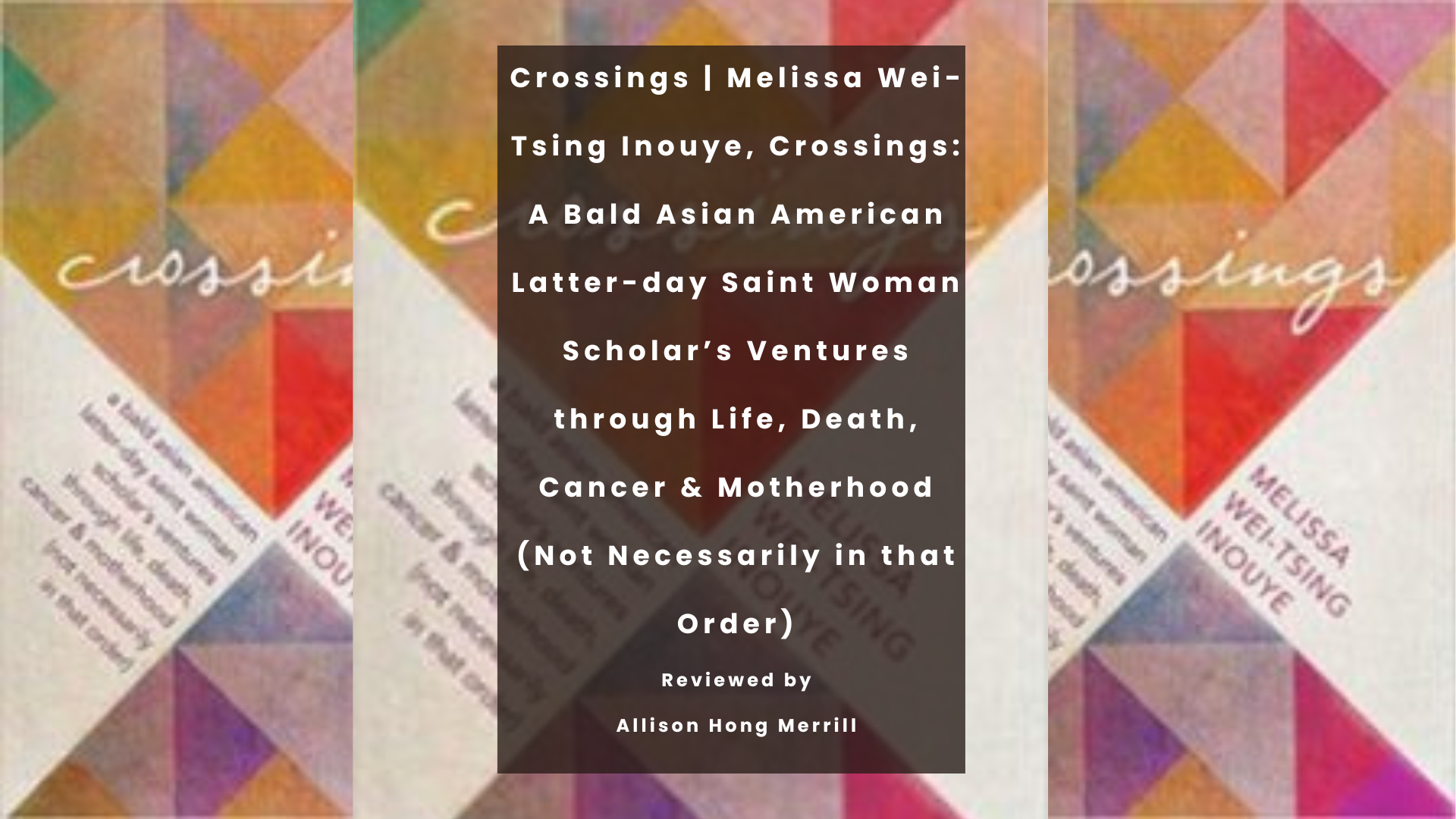Articles/Essays – Volume 52, No. 3
Crossings | Melissa Wei-Tsing Inouye, Crossings: A Bald Asian American Latter-day Saint Woman Scholar’s Ventures through Life, Death, Cancer & Motherhood (Not Necessarily in that Order)
Most books serve a specific purpose: to provoke emotions, to educate, or to entertain. Rarely do I find a book that’s simultaneously evocative, educational, and entertaining. Crossings is one of the few. From researching in China to gardening in New Zealand, from running in Taiwan to commuting in Hong Kong, from Chinese history to Mormon beliefs, from family love to cancer treatment, from pencil drawings to annual newsletters, Inouye shares her observation and understanding of life from various angles, touching on common aspects of our shared humanity. The result is Crossings, a hybrid-genre collection of literature and art, biographical accounts, and research topics. Inouye has masterfully crafted this book with her heart, soul, and a brilliant intellect.
Melissa Inouye is an American scholar of Japanese and Chinese descent who teaches at the University of Auckland, New Zealand. Her rich cultural heritage, combined with her profound life experiences through extensive global traveling and academic research, enrich her writing and will ensure that it resonates with readers from all backgrounds.
I can relate to most parts of Crossings because I, too, am Chinese, a wife, a mother, a member of the Church of Jesus Christ of Latter-day Saints, and a returned missionary who served in the Taiwan Taichung Mission. At times I feel that Inouye wrote Crossings with me in mind, carefully choosing the messages that I needed to read. But I’m sure a Buddhist monk who lives on a high mountain in Tibet or a Muslim woman in the Philippines will find Inouye’s message just as relatable. After all, life, death, and love are universal themes in our human experiences. Which is to say, this book is also for you.
You might say, Yep, that’s right, as you read her words, “In fact, your priorities will become who you are. They will shape your impact on other people and the legacy that you leave behind” (173).
You might nod in agreement as you read, “The main historical legacy that each of us will leave this world will be in the form of our influence in the lives of others. Precisely because of us, the lives of our parents, siblings, children, friends, and fellow students will be distinctly better or worse” (182). Crossings is evocative.
The essay “What Ana Said” is Inouye’s response to eleven-year-old Ana’s comment “But girls don’t get the priesthood. The men are in charge of the women” (124)––about a phenomenon in the Mormon Church. In a comprehensive explanation, Inouye takes the reader on to a complex exploration of the Mormon belief and practice of the priesthood. She states that patriarchy is harmful for everyone, but she is “certain that leaders with authority to direct the Church are committed to addressing structural imbalances within our fellowship” (136).
Inouye discusses women’s influences in the Church, and her research on the subject of Heavenly Mother is exceptionally insightful. For example, she mentions that David Paulsen and Martin Pulido reviewed over six hundred references to Mother in Heaven in the Church literature. Apostles such as John A. Widtsoe and James E. Talmage declared, “[We have] a mother who possesses the attributes of Godhood.” And that Brigham Young taught, “We were created . . . in the image of our father and our mother, the image of our God.” Inouye suggests that, “Men, who hold the levers of institutional power, can conscientiously ensure that women are included in opportunities to speak, teach, give spiritual counsel, participate in collective decision-making, and receive visible respect. . . . Both women and men can . . . invoke the love and divine parenthood of both Heavenly Father and Heavenly Mother” (142). Crossings is educational.
But this book is in no way a collection of didactic doctrinal theories or preachy religious arguments. You’ll be delightfully surprised to discover Inouye’s humorous tone as she introduces her husband and their four children by using their botanical nicknames. Throughout the book, she expresses her love for them with heartfelt written words, as well as lifelike pencil sketches. I especially love Inouye’s use of drawing to illustrate her sixteen-month-old boy’s favorite forbidden activities: foraging in the delicious trash can, splashing in the delightsome toilet, and gnawing on the enticing power cord. She takes a gentle approach to write about delicate family matters. For instance, her four-year-old daughter fails the admission screening interview of a prestigious preschool in Hong Kong; her husband’s never-ending workload in a Hong Kong law firm leads to their decision that she accepts a teaching job at the Auckland University in New Zealand, where he becomes a stay-at-home dad. There’s no resentment or bitterness in the narration, only pure light-hearted fun, making me smile here and chuckle there. From Inouye, I learned to look at life’s challenges through different lenses: humor, humility, and hope. Crossings is entertaining.
Inouye shows her intelligence, spirituality, and genuineness in Crossings, and these qualities made a lasting impression on me. This is a five-star book, feeding me the knowledge for which I didn’t know I hungered. I highly recommend it. Ask your book club to read and discuss it. For birthday, Mother’s Day, Father’s Day, or Christmas, give Crossings to your spouse, parents, friends, or anyone else who already has everything. Happy reading!
Melissa Wei-Tsing Inouye. Crossings: A Bald Asian American Latter-day Saint Woman Scholar’s Ventures through Life, Death, Cancer & Motherhood (Not Necessarily in that Order). Provo: Neal A. Maxwell Institute for Religious Scholarship, 2019. 288 pp. Paperback: $15.99. Kindle: $16.99. ISBN: 9781944394806.


 Back to full Issue
Back to full Issue

